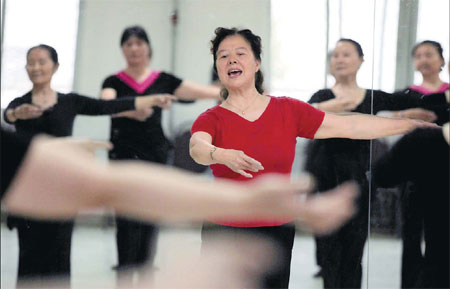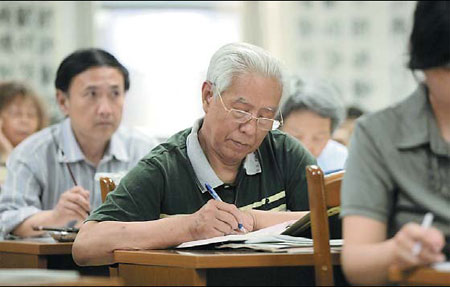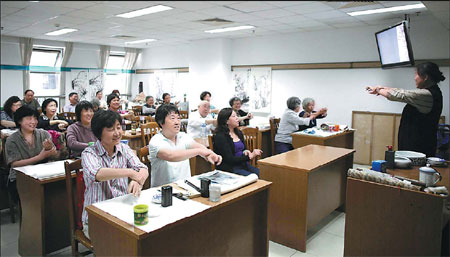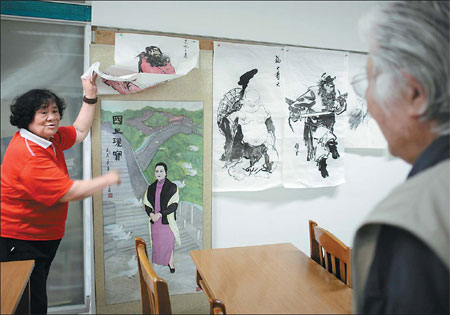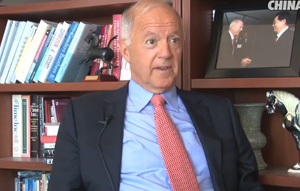Never too old to learn new tricks
Updated: 2013-06-07 09:19
By Luo Wangshu (China Daily)
|
|||||||||||
|
Li Guilan (center), 67, teaches dance to senior students at the Chinese Academy of Sciences' College for the Elderly in Beijing. Photos by Wang Jing / China Daily |
|
Students take notes in a calligraphy class. |
|
Students warm up before their painting class at Beijing Haidian University for Seniors. |
|
Students display their artworks at the university in Haidian. |
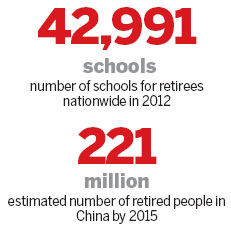
The huge number of retired Chinese enrolling at 'universities for the aged' is imposing immense pressure on the education system for the elderly
Song Qing was woken by her alarm clock at 3 am on a bitterly cold December morning in 2012. The recently retired 57-year-old cocooned herself in a thick down coat and traveled across Beijing to sign up for a calligraphy and painting class at Beijing Haidian University for Seniors, or BHUS. She arrived at the school at 4:15 am, ready for the start of enrollment at 7:30 am.
"I'd heard that in previous years, even students who arrived as early as 6 am failed to register for classes, so I decided to come earlier to guarantee a place," says Song.
During the spring semester, BHUS provides 12 classes, catering to 400 students. Although the classes were massively oversubscribed, Song was lucky enough to secure a place and has started her new "school life" in the calligraphy class.
Millions of retired Chinese people want to stay active by attending school, but only the lucky ones are able to win a place, because there are often far more applicants than places, even though figures from the China Association of Universities for the Aged show that 42,991 schools operated nationwide in 2012.
Shortage of places
"Today's retirees are better educated than previous generations and they pay more attention to the quality of their post-working lives," says Yuan Xinli, executive vice-director of the China Association of Universities for the Aged.
BHUS would like to expand the school and offer more places, according to Chu Shijun, the vice-president. However, the capital's largest university for retirees, with almost 2,600 students, has just nine classrooms.
"With the current facilities, our school is unable to recruit more students," says Chu, who admits that the shoestring budget has resulted in a shortage of facilities.
Schools for retirees are run as charitable institutions. The average tuition fee is about 200 yuan per semester, and the colleges are mostly funded by governments at different levels.
In Beijing, each district provides financial support. BHUS received 1 million yuan ($163,000) from Haidian district in 2012. It also earned 700,000 yuan from tuition fees and 300,000 yuan through leasing classrooms at the weekends. The annual operating cost is about 1.9 million yuan, leaving a paltry 10,000 yuan profit, nowhere near enough to fund expansion plans.
In some places, such as Heilongjiang province and the municipalities of Tianjin and Chongqing, the provincial government fully subsidizes retiree schools. Meanwhile, those associated with large companies and organizations, such as the Chinese Academy of Sciences, also receive funding from their parent organizations.
However, the low profit means nongovernmental and business investors are not interested in putting money into schools, so the financial burden falls on the government.
Zheng Min, vice-president of the Chinese Academy of Sciences' College for the Elderly, located on the campus of the Xi'an Institute of Optics and Precision Mechanics in Shaanxi province, says society pays great attention to adult education and invests in it heavily, but makes little effort to provide education for retirees.
Meanwhile, Yuan from the China Association of Universities for the Aged, outlines another reason for the imbalance in demand and supply: "Some elderly students attend school year after year and never leave. Because students don't leave and applicant numbers are always rising, the schools are oversubscribed. I know one woman in her 80s who has attended retiree school for more than 20 years."
Oversubscribed schools
Figures from the Ministry of Civil Affairs show that by the end of 2009, around 12.5 percent of the Chinese population was aged 60 or older. At 167 million, the figure is greater than the population of some of China's neighbors, such as Russia or Japan.
In China, many women retire between the ages of 50 to 55, while for men the figure is usually 55 to 60. Many are still energetic and keen to resume education.
China's retired population will reach 221 million by 2015, according to Yuan's estimate, so it's important to open more schools for seniors to cater for the rising demand.
In 2005, the number of retiree students was approximately 2.34 million. By 2011, that number had doubled to nearly 5 million.
BHUS provides 79 classes, 72 of them in painting and calligraphy. Others include computing and photography.
Xiong Zhenchang, director of the school's admissions office, says they underestimated the demand for enrolment in December. Having expected around 80 people, the staff found twice that number waiting outside the building when they arrived at 6:30 am. "The applicants had lined up long before we arrived," says Xiong. His concern has now shifted to registration day for the autumn semester, which will be held in June.
"Applicants are likely to arrive earlier in summer than in winter," he says, adding that the school plans to run 14 classes and admit 623 new students this fall.
Song Qing left home at around 3:30 am on registration day and arrived at the school about 45 minutes later. Her husband drove her to the school because there is no public transport in that area in the early morning. "My husband is very supportive," Song says gratefully.
However, despite her early start, Song was not first in line. "I saw a woman in her late 60s sitting on a stool, waiting to register," she says. The woman told Song that she had stayed overnight at a nearby motel so she could arrive early and be sure of a place.
While BHUS is open to the public, many schools aren't, making it hard for outsiders to gain entry. The CAS College for the Elderly is one of them. The school, established in 1985, has 11 branches nationwide and its Beijing campus provides 48 classes for more than 1,400 students.
However, nearly 80 percent of the students are retired CAS employees or members of their families. "We'd love to offer more seats to public applicants, but the tuition fee is very low and the academy provides a subsidy for each place. We just don't have enough funding to subsidize public applicants," says Sun Jianguo, president of the CAS College for the Elderly, and also vice-director of the China Association of the Universities for the Aged.
A pragmatic approach
Unlike some regular students, retiree students are usually motivated by pragmatism.
Wang Jiaren, one of 2.5 million people aged 60 or older in the capital, studies English at the CAS College for the Elderly. The class starts at 3 pm every Monday, but Wang - who retired from Beijing Yuetan Middle School in 2000 - always arrives 30 minutes early to spend a "fulfilling" afternoon with his 30 classmates
"I am very fond of English," says Wang, 73, who insisted on speaking in English. "Language is my life-long interest. We prepare different topics in advance and bring them along to share with classmates. The topics revolve around our experiences. This afternoon, for example, we shared our reasons for studying English," he says. "We give presentations. Some of my fellows were shy at the beginning and afraid of talking in another language in front of the whole class. But now, they really enjoy it."
Qiu Wanhua, who also studies English, travels across Beijing once a week to attend college.
The 78-year-old teaches her 6-year-old granddaughter at home. "I am happy to have something to share with her. The early years are so important for language development. I like English and I hope I can create an environment that will help her fall in love with the language as well," she says.
Wang Baoling has studied electric piano for three years. Although the 73-year-old, who attends the CAS College for the Elderly, can't lift her hands as high as younger people, or produce clear, independent notes, she enjoys "playing".
"I have always loved music. I used to be a singer, but now I can be a player too. Not a good one, but still a player," says the retired teacher with a smile.
The teachers appreciate the students' enthusiasm.
Chang Yang, who teaches singing at Chongqing Senior College, has taught around 5,000 students since he joined the school in 2007. "Singing is the most popular subject at the school, but I'm not looking to make money through this job," says the 31-year-old, who earns 60 yuan an hour and teaches class on Thursday afternoons. His motivation is more altruistic, because he also owns a singing school in the city, where he charges between 200 and 300 yuan an hour.
"I give the retired students something that touches them and they give me something back and move me in turn. When I interact with the students, I see their joy at learning to sing," he says.
Liu Yan, who teaches English at the CAS College for the Elderly says: "My students are lovely and extremely earnest and diligent." She teaches English at the CAS College for the Elderly. She's been there for eight years, but has also taught at several universities and training classes for retirees in the capital.
"Some come to class with a grounding in the language, while others are beginners who are learning English so they can communicate with their grandchildren who were born overseas and only speak English. Regardless of their reasons for learning, they pay close attention and take it very seriously," adds the 57-year-old.
"The curricula in colleges for retirees are really driven by the students' needs," says Sun.
"For example, a decade ago, our school offered basic computer courses, because at that time most of the students had little understanding of information technology. They needed to understand the new technology to stay in touch. However, nowadays most of our students know about computers, so instead, we offer photography and image or video-processing courses," he says.
Growth trend
Although the number of retiree schools rose to almost 43,000 in 2011 from 26,000 in 2005, they are still unable to meet the demand resulting from the rapid rise in the number of retirees.
The central government's 12th Five-Year Plan (2011-15) related to aging pledged to increase investment in colleges for retirees and expand the scale of the schools. The plan also encourages social efforts to jointly develop education for retirees.
"It's very important to establish relevant regulations and laws for the education of retirees. If education for retirees were written into law, all the difficulties could be fixed over time, and under the guidance of the regulations," says Yuan.
He believes that a national policy could also address the problem of over-demand and suggested research be conducted into distance learning. "Students could watch the course video at home, complete their assignments and bring them into class," he says, adding that the new teaching model would reduce the pressure for places and provide greater opportunities for students to engage with classmates and teachers.
Chu from the BHUS believes the demand for colleges for retirees will rise. "Retired people don't need to worry about money. They pay more attention to their spiritual lives. Returning to school is one of the best choices for them," he says.
For Song Qing, her calligraphy and painting classes have added a new dimension to life. "Sometimes I can't stop painting at night. I often paint until 2 or 3 am. Coming back to school has made me feel young and passionate again," she says.
Contact the writer at luowangshu@chinadaily.com.cn
luowangshu@chinadaily.com.cn
(China Daily European Weekly 06/07/2013 page24)
Today's Top News
EU wine producers surprised by investigation
China to protect investors' interests: President Xi
DPRK proposes meeting with ROK on Sunday
Xi arrives in California for summit with Obama
China's economy might be No 1 in 2030
Probe of EU wine 'not retaliation'
355,000 parents have lost only children
Russian President Putin, wife announce divorce
Hot Topics
Lunar probe , China growth forecasts, Emission rules get tougher, China seen through 'colored lens', International board,
Editor's Picks

|

|
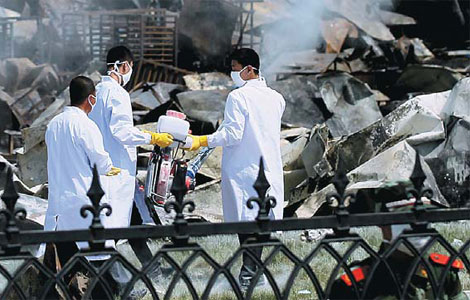
|

|

|

|
